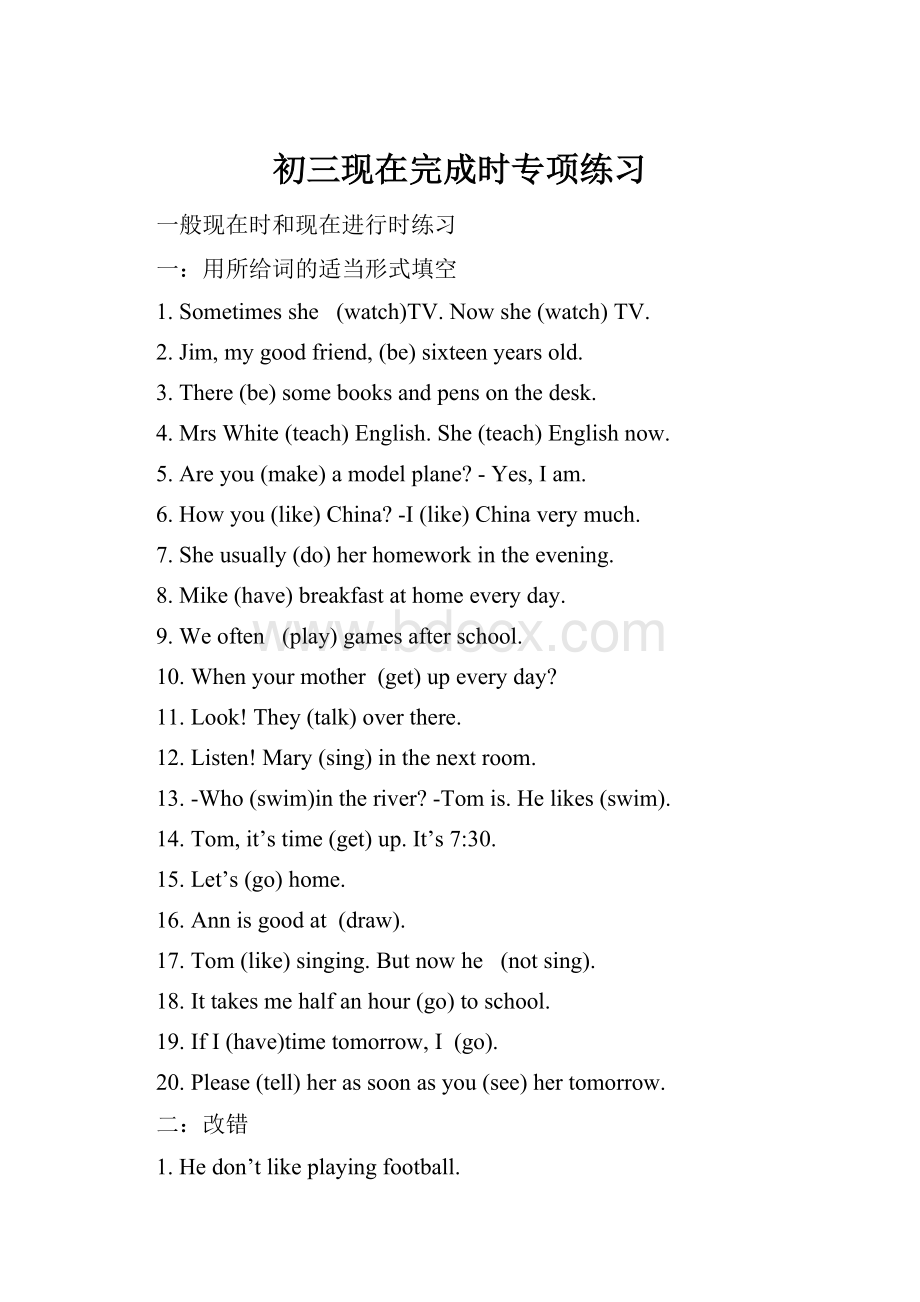 初三现在完成时专项练习.docx
初三现在完成时专项练习.docx
- 文档编号:12907643
- 上传时间:2023-04-22
- 格式:DOCX
- 页数:13
- 大小:22.47KB
初三现在完成时专项练习.docx
《初三现在完成时专项练习.docx》由会员分享,可在线阅读,更多相关《初三现在完成时专项练习.docx(13页珍藏版)》请在冰豆网上搜索。

初三现在完成时专项练习
一般现在时和现在进行时练习
一:
用所给词的适当形式填空
1.Sometimesshe(watch)TV.Nowshe(watch)TV.
2.Jim,mygoodfriend,(be)sixteenyearsold.
3.There(be)somebooksandpensonthedesk.
4.MrsWhite(teach)English.She(teach)Englishnow.
5.Areyou(make)amodelplane?
-Yes,Iam.
6.Howyou(like)China?
-I(like)Chinaverymuch.
7.Sheusually(do)herhomeworkintheevening.
8.Mike(have)breakfastathomeeveryday.
9.Weoften(play)gamesafterschool.
10.Whenyourmother(get)upeveryday?
11.Look!
They(talk)overthere.
12.Listen!
Mary(sing)inthenextroom.
13.-Who(swim)intheriver?
-Tomis.Helikes(swim).
14.Tom,it’stime(get)up.It’s7:
30.
15.Let’s(go)home.
16.Annisgoodat(draw).
17.Tom(like)singing.Butnowhe(notsing).
18.Ittakesmehalfanhour(go)toschool.
19.IfI(have)timetomorrow,I(go).
20.Please(tell)herassoonasyou(see)hertomorrow.
二:
改错
1.Hedon’tlikeplayingfootball.
2.Whattheyeatintheparty?
3.DamingwatchsTVintheevening.
4.Doesheusuallyhasaparty?
5.Hefishingnow.
6.Whereareyoucomefrom?
7.IamlikeEnglishverymuch.
8.Dotheyoftenhomeworkafterschool.
三:
把一般现在时改成现在进行时。
1.Hethrowsafrisbyeveryafternoon.Heafrisbynow.
2.Myparentsoftenmakecakesforme.Myparentscakesformenow.
3.Theymustcleanthebedroomonceaweek.Look,theythebedroom.
4.ThestudentsreadEnglisheveryday.ThestudentsEnglishatthemoment.
5.Themonkeyjumpsupanddown.Themonkeyupanddown.
2017年中考英语单项选择题练习《动词的时态》
1.--Oh,dears,powercut!
--Sorry,Ididn’tknowyouthewashingmachine.
A.areusingB.usedD.wereusing
2.--Ithinkourteacher,MrsAllen,knowseverything.
--Iagree.Becausesheover2,000books.
A.readusedreading
3.ItseemsthatE1Ninosomedisastersintheworldinthepastfewmonths.
A.hascausedB.iscausingC.willcauseD.caused
4.--HaveyoueverclimbedMountTai,Carol?
--Yes,IinTaianforaweeklastyearandreachedthetopofittwice.
A.hadstayedC.stayedD.havestayed
5.--IhaveeverseenAliceinWonderlandII(《爱丽丝梦游仙境II》)
--When?
--Twoweeksago?
A.didyouseeityouseenityouseeitD.willyouseeit
6.Look!
Adogablindmanacrosstheroad.
AleadsB.leadC.isleadingd.led
7.Thismuseumhereforover80years.Itoneoftheoldestbuildingsinthiscity.
A.Is,was,B.hadbeen,isC.was,hasbeendhasbeen,is
8.Hethecitysincehegraduatedfromcollege.
A.HasleftB.leftC.hasbeenawayfrom
9.--Canjohnplaysoccerwithus,Mrs.Black?
--Onemoment,please.Heonthephonetohiscousin.
A.TalksB.talkedC.talkingd.istalking
10.SteveTVinthelivingroomwhenhismothercamein.
A.WaswatchingB.watchesC.iswatching
11.--It’sthesecondtimeicametoXiamen.Italot.
--Yes,it’smoreandmorebeautiful.
A.WaschangingB.haschangedC.willchange
12.Leifengformanyyears.Buthisspiritisstillencouragingus.
A.DiedbeendeadC.hasdied
13.--MayIspeaktoMr.Lee?
--Sorry,heHarbin.Hethecityfortwodays.
A.hasbeento,hasbeeninB.hasgoneto,hasbeentogoneto,hasbeenin
14.--Areyougoingtowatch“RunningMan”tonight?
--No!
Iitwithyparentsonlyonce.Idon’tthinkit’sexciting.
A.SeeB.haveseenC.willseeD.amseeing
15.Theengineersanewcomputerinourclassroomthewholeyesterdaymorning,sowehadourclassesintheschoolhall.
A.WerefixingC.havefixedD.arefixing
16.--CouldyoutellmewhereyoufoundMissGaojustnow?
--Certainly.Intheprincipal’soffice.Theyhappilyatthattime.
A.Aretalkingtalkedtalking
17.--It’sagreatpitythatthefamousfootballplayerhasgonetoanotherclub.
--Don’tworry.Theyanothertopstarrecently.
A.buybought
18.--Mom,Ithegreatwallinthelasttwoyears.
--Well,Iwilltakeyoutherenextmonth.
A.don’tvisitB.won’tvisitC.haven’tvisitedD.didn’tvisit
19.Everyonewantstoreachthetopofthemountain,butallthehappinesshappenswhileyouit.
A.climbB.climbedC.areclimbingD.haveclimbed
20.--youeverHanHongsinglive?
--ofcourse.Acoupleoftimesindifferentcities.
A.Have,seenB.did,seeC.do,seeD.are,seeing
21.--Whatwouldyouliketohaveforsupper,jack?
--Eithernoodlesorriceok.Idon’tmid.
A.areB.wereC.isD.was
22.--Jim.Whothatinthewhitecoat?
--It’smybrother,Joe.
A.didB.does
23.--Doesjimmystillworkasadriver?
--No.Hehasfortwoyears.
A.leftthecompanyB.gonetoshanghaiC.studiedincollegehisjob
24.--Wheredidyougolastweekend?
--Itothegreatwall.
A.goB.wentC.willgoD.havegone
25.Pleasedon’tmakesomuchnoise.Thebabynow.
A.SleepsB.sleptC.willsleepD.issleeping
26.It’snicetoseeyouagain.Weeachothersince2014.
A.Won’tseeB.don’tseeC.haven’tseenD.didn’tsee
27.--IheardyourfatherhadgonetoBeijingonbusiness.
--Yes,andheinthreeweeks.
A.willreturnreturned
28.--HaveyouwatchedthenewmovieKungFuPanda3,Kelly?
--Notyet,Iitwithmyclassmatetonight.
A.willwatchB.waswatchingC.havewatched
29.Myhusbandalwaysmeflowerseveryweekbeforewegotmarried,butnowhenever.
A.sent,does,doesgoingtosend,do,do
30.--Haveyoureturnedthebooktothelibraryyet?
--Notyet.Don’tworry.Iitsoon.
A.returnC.havereturnedD.willreturn
31.Lastweek,Vivianadressforhermotherwithherfirst-monthsalary.
A.buyB.boughtC.willbuyD.wouldbuy
32.-youevertothegreatwall?
-Yes,threetimes.
A.Has,beenB.have,beenC.have,gone
33.--Ihavetobeoffrightnow.
--Whatapity.Iyoucouldstayalittlelongerwithus.
A.ThoughtB.amthinkingC.thinkD.wasthinking
34.Schoolviolence(暴力)muchattentionofthewholesocietyandpeoplearecallingthegovernmenttomakelawsagainstitasearlyaspossible.
A.drewB.willdrawC.hasdrawnD.wasdrawing
35.unlesstheweather,wewillhavetocancelthepicnic.
A.ImproveB.improvesC.improvedimprove
2017年初三中考英语
现在完成时专项练习
1、时态讲解:
现在完成时
(1)构成:
现在完成时由助动词have+过去分词构成,助动词have有人称和数的变化。
第三人称单数用has,其余用have.
现在完成时的否定式直接在助动词后面加上not,疑问式是把助动词提到主语之前。
以study为例,其否定式,疑问式和简单回答形式如下:
否定式:
疑问式:
Ihavenot(haven’t)studied.....
HaveIstudied...?
Youhavenot(haven’t)studied...
Haveyoustudied...?
Hehasnot(hasn’t)studied....
Hashestudied...?
否定疑问式:
简单回答(肯定/否定)
HaveInot(Haven’tI)studied...?
Yes,youhave.No,youhaven’t.
Haveyounot(Haven’tyou)studied...?
Yes,Ihave.No,Ihaven’t.
Hashenot(Hasn’the)studied...?
Yes,hehas.No,hehasn’t.
(2)用法:
1)现在完成时通常表示在说话之前已经完成的动作或存在的状态。
说话人强调的是该动作或状态对现在的结果或影响。
Mydaughterhasjustgoneout.我女儿刚出去。
I’msurewe’vemetbefore.我肯定我们以前见过面。
Shehasarrived.她到了。
2)表示持续到现在的动作或状态,往往和包括现在在内的表示一段时间的状语连用,如recently,already,just,lately,for...,since...,yet等,如:
Ihaven’theardfromherthesedays.这些日子我没有收到她的信。
Wehaven’tseenyourecently.最近我们没有见到你。
Theyhavebeenawayfortwoyears.他们离开已经两年了。
ShehasbeenwithussinceMonday.她自从星期一开始就和我们在一起。
注意:
a)since和for的区别
since后接时间点,如1993,lastterm,yesterday,thetimeIgotthere
for后接一段时间,表示“长达多久”,如tenyears,awhile,twodays等。
Exercise:
用since和for填空
1.JimhasbeeninIrelandMonday.
2.JillhasbeeninIrelandthreedays.
3.HisaunthaslivedinAustralia15days.
4.Maryisinheroffice.Shehasbeenthere7o’clock.
5.Indiahasbeenanindependentcountry1974.
6.Thebusislate.They’vebeenwaiting20minutes.
7.Nobodylivesinthosehouses.Theyhavebeenemptymanyyears.
8.Mikehasbeenillalongtime.HehasbeeninhospitalOctober.
3)表示短暂意义的动词如arrive,leave,borrow,buy,begin,start,die等。
在完成时当中不能和表示一段时间的状语连用。
因为它们表示的动作不可能持续。
因此,不能说:
Theoldmanhasdiedfor4months.X
Theyhaveleftonlyfor5minutes.X
以上两句可以改为:
Theoldmanhasfor4months.
Theyhaveonlyfor5minutes.
4)have(has)been和have(has)gone的区别:
表示“曾到过某地”要用have(has)been,表示“已经去某地”要用have(has)gone。
试比较:
Wherehashebeen?
他刚才到哪里去了?
(已经回来)
Wherehashegone?
他上哪儿去了?
(人不在)
TheyhavebeentoCanada.他们到过加拿大。
(现在已经不在加拿大)
TheyhavegonetoCanada.他们到加拿大去了。
(可能在路上和已经到加拿大)
5)现在完成时不能和表示过去的时间状语连用。
如yesterday,lastyear,in1976,twodaysago,justnow,whenIcamein,但可以和already,yet,sometimes,always,often,before,lately,recently,once,twice,ever,never等连用。
例如:
Shehasalreadycome.她已经来了。
Ihaven’treadityet.我还没读过这个。
Ihavemethimbefore.我从前曾见过他。
MaHonghasalwaysbeenagoodstudent马红一直是个好学生。
Ihaveoftenseenhiminthestreet.我经常在街上看见他。
TheyhaveneverbeentoYan’an.他们从未去过延安。
Ihaven’tseenhimlately.我近来没看到他。
1.用作及物动词的wish和hope之比较
1.与不定式短语搭配时的异同比较
作及物动词时,wish和hope都与todosth.搭配。
但分析表明,wishtodosth.意为“现在”想做某事。
它表达的是眼下的要求或意愿(一般容易实现),其中“do”隐含的时间状语是“now”或“then”。
而hopetodosth.意为想在“将来”做成某事,它表达的是一个想要实现的目标(不一定能实现),其中“do”隐含的时间状语是“insometimetocome”。
请比较下更从语料库中摘引的例子(注:
下面举例均摘自Cobuild语料库)。
Aladywishedtoseemeurgently.
Iwishnowtogiveamoredetaileddescriptionofthe1974RemembranceDaymarch.
DRIhopestoOut-DosMs-DoswithDRDos.
TheirlawyerhopestotakethecasetotheEuropeanCouncil.
有时,wish与todosth.搭配主要是表示礼貌和郑重。
如:
TheauthorswishtothankRonHochsprungatAppleforhispatienceandsupport.
2.与that引导的从句搭配时的异同比较
作及物动词时,wish和hope都与that-clause搭配,但存在三方面的差异:
1)在组合模式上,wish和that-clause只以sb.+wish+that-clause的形式组合。
而hope和that-clause可以sb.+hope+that-clause以及it+be+hoped+that-clause两种形式组合。
2)在语义上,wish+that-clause和hope+that-clause虽都表示愿某种理想的情况(由that-clause表示出来)在“过去”、“现在”或“将来”出现。
但wish意味着所希望的是与事实相反的情况。
因此几乎没有出现的可能性,而hope意味着说话人认为所希望的情况有可能出现。
Exercise:
intheblankswiththeproperform.
1.Ialready(see)thefile.I(see)itlastweek.
2.he(finish)hisworktoday?
Notyet.
3.Myfatherjust(come)backfromwork.Heistirednow.
4.Where’sLiMing?
He(go)to
- 配套讲稿:
如PPT文件的首页显示word图标,表示该PPT已包含配套word讲稿。双击word图标可打开word文档。
- 特殊限制:
部分文档作品中含有的国旗、国徽等图片,仅作为作品整体效果示例展示,禁止商用。设计者仅对作品中独创性部分享有著作权。
- 关 键 词:
- 初三 现在完成时 专项 练习
 冰豆网所有资源均是用户自行上传分享,仅供网友学习交流,未经上传用户书面授权,请勿作他用。
冰豆网所有资源均是用户自行上传分享,仅供网友学习交流,未经上传用户书面授权,请勿作他用。


 《地质测量图绘制细则》.docx
《地质测量图绘制细则》.docx
